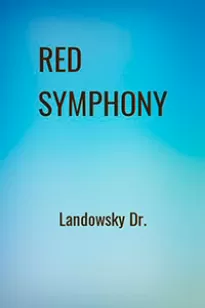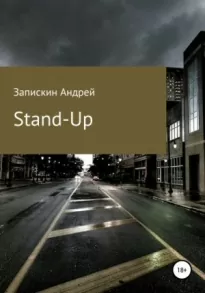RED SYMPHONY

- Автор: Dr. Landowsky
- Жанр: Старинная литература
Читать книгу "RED SYMPHONY"
G. - A little; you wrap up such things in such impenetrable casuistry.
R. - If it is necessary to end, then I can only express myself in this way. Let us see if I shall not be able yet to help to understand. It is known that Marxism was called Hegelian. So this question was vulgarised.Hegelian idealism is a widespread adjustment to an uninformed understanding in the West of the natural mysticism of Baruch Spinosa. "They" are Spinosists: perhaps the matter is the other way round, i.e. that Spinosism is "Them," insofar as he is only a version adequate to the epoch of "Their" own philosophy, which is a much earlier one, standing on a much higher level. After all, a Hegelian and for that reason also the follower of Spinosa, was devoted to his faith, but only temporarily, tactically. The matter does not stand as is claimed by Marxism, that as the result of the elimination of contradictions there arises the synthesis. It is as the result of the opposing mutual fusion, from the thesis and anti-thesis that there arises, as a synthesis, the reality, truth, as a final harmony between the subjective and objective. Do you not see that already? In Moscow there is Communism: in New York Capitalism. It is all the same as a thesis and anti-thesis. Analyze both. Moscow is subjective Communism, but Capitalism objective - State Capitalism. New York: Capitalism subjective, but Communism objective. A personal synthesis, truth: the Financial International, the Capitalist-Communist one. "They."
* * *
The meeting had lasted about six hours. I once more gave some drug to Rakovski. The drug it was obvious, worked well, although I was only able to observe this by certain symptoms of animation. But I think that Rakovsky would have spoken just the same in a norrnal condition. Undoubtedly the theme of the conversation concerned his speciality and he had the passionate will to epose that, about which he spoke. Since, if all this is true then an energetic attempt had been made
{p. 53} to enforce the triumph of his idea and plan. If this was untrue, then there was an extraordinary phantasy and this was a wonderful manoeuvre for saving his already lost life.
My opinion of all that had been heard can not be of any importance. I have not got a sufficient erudition in order to understand its universality and horizons. When Rakovsky touched on the most important part of the theme I had the same feeling as at that moment when I saw myself for the first time on the X-ray screen. My surprised eyes saw something diffuse and dark, but real. Something like an apparition; I had to co-ordinate his figure and movements, corelations and actions to the degree to which it was possible to guess with the help of logical intuition.
I think that I had observed during several hours the "radiograph of revolution" on a world-wide scale. It is possible that in part lt failed, was deformed, thanks to circumstances or personalities which reflected it, it is not for nothing that the lie and dissimulation are permitted in the revolutionary struggle and are accepted as moral. And Rakovsky, a passionate dialectician of great culture and a first-class orator, is first of all and above all a revolutionary fanatic.
I re-read the conversation many times, but each time I felt how there rose in me the feeling of my incompetence in this respect. That which until then had seemed to me, and to the whole world, to be the truth and obvious reality, like blocks of granite, where the social order stands as on a rock, immovable and permanent, all that became transformed into a thick fog. There appear colossal, unmeasurable, invisible forces with a categorical imperative, disobedient, sly and titanic at the same time, something like magnetism, electricity or the attraction of the earth. In the presence of this phenomenal disclosure I felt like the man from the stone age, whose head was still full of primitive superstitions concerning the phenomena of nature, and who had been suddenly transposed one night into the Paris of to-day. I am amazed even more than he would have been.
Many times I disagreed. At first I convinced myself that everything which Rakovsky was telling was the product of his extraordinary imagination. But even having convinced myself that I was a toy in the hands of the biggest of all the writers of novels, I tried in vain to find enough strength, logical reasons and even people with a sufficient personality, who would have been able to explain this gigantic progress of the revolution.
I must confess that if only those forces participated here, as also reasons and people, which are mentioned officially in written histories, then I must declare that the revolution is a miracle of our age. No, when I was listening to Rakovsky, I could not admit that a small group of Jews, who emigrated from London, had achieved that this "apparition of revolution," which had been called forth by Marx in the first lines of the Manifesto, had become to-day a gigantic reality and a universal threat.
Whether what Rakovsky told is true or not, whether the secret and real streneth of Communism is International Capital, it is the obvious truth for mne that Marx, Lenin, Trotzky and Stalin are an insufficient explanation for that which is happening.
{p. 54} Whether these people are real or phantastic, whom Rakovsky calls "Them" with an almost religious tremor in his voice, is the question. But if "They" do not exist then I shall have to say of them what Voltaire said of God: "He will have to be invented," since only in that case can we explain the existence, extent and force of this world-wide revolution.
After all, I have no hope of seeing it. My position does not allow me to view with great optimism the possibility that I shall survive until the near future. But this suicide of the bourgeois European States, of which Rakovsky spoke, and which he proves as being inevitable, would be for me, who has been initiated into the secret, the magisterial and definite proof.
* * *
When Rakovsky had been led away to his place of imprisonment Gabriel remained some time immersed in himself.
I looked at him, not seeing him; and in fact my own ideas and conceptions had lost the ground under their feet and were somehow suspended.
"How do you look on all this" asked Gabriel.
"I do not know, I do not know" I replied, and I spoke the truth; but I added "I think that this is an amazing man and if we are dealing with a falsification, then it is extraordinary; in any event it is a piece of genius."
"As a result, if we shall have the time, we must have an exchange of views ... I am always interested in your opinion of the profane, a doctor. But now we must agree about our programme. I need you as a professional, but as a modest man. That which you have heard, as the result of your peculiar function, can be wind and smoke which is carried by the wind, but it can also be something, the importance of which cannot be exceeded by anything else. Here a moderate terminology is inappropriate. Given this last possibility, a strong feeling of precaution forces me to limit the number of people who know ahout it. For the moment only you and I know. The man who manipulated the recording machine does not know any French. The fact that we did not speak in Russian was not my caprice. In short: I shall be grateful to you if you will be the translator. Sleep for some hours. I shall now give the necessary instructions so that the technician would agree the time with you, and as soon as possible you must translate and write down the conversation, which he will reproduce for you to hear. It will be a hard job; you cannot use a typewriter and the recorder will have to move very slowly. When you will have done the French version I shall read it. A few remarks and epigraphs will be necessary, and I shall add them. You can use a typewriter?"
"Very badly, very slowly, only with two fingers."
"Well arrange it somehow. Please make few mistakes."
Gabriel called the man. We arranged to begin work at eleven o'clock and it was already almost seven. We went to sleep a little.
{p. 55} I was called punctually. We sat down in my small study.
Gabriel had asked me to make two copies of the translation. I made three, in order to hide one for myself. I took the risk as he went to Moscow. I am not sorry that I had had the courage for this.
* * *
EPILOGUE
As is well known, Stalin followed the advice of Rakovsky. There was a pact with Hitler. Also the Second World War served solely the interests of the revolution.
The secret of these changes of policy can be understood from a further conversation between Gabriel and Doctor Landowsky, which is given in a later chapter of "The Red Symphony." Here are some extracts from it:
GABRIEL - Do you remember the conversation with Rakovsky ... Do you know that he was not condemned to death? Well knowing all this you need not be surprised that Comrade Stalin had thought it to be wise to try that apparently so unlikely plan ... Here nothing is risked and, on the contrary, one can gain a great deal ... If you will strain your memory you will be able to understand several things.
DOCTOR - I remember everything rather well. Do not forget that I heard the conversation twice, then both times I wrote it, and in addition I translated it ... May I find out if you know the people whom Rakovsky called "Them"?
G. - In order to shew you my confidence I shall tell you - no! We do not know for sure who "They" are, but at the last moment there was confirmed a great deal of what Rakovsky had told; for example it is true that Hitler was financed by the Wall Street bankers. Much else is also true. All these months during which I have not seen you, I devoted to an investigation, connected with Rakovsky's information. It is true that I was not able to establish just which people are such remarkable personages, but it is a fact, that there is a kind of entourage which consists of financiers, politicians, scientists and even ecclesiastical persons of high rank, wealth and power, who occupy high places; if one is to judge their position (mostly as intermediaries) by the results, then it seems strange and inexplicable, at least in the light of ordinary conceptions ... since in fact they have a great similarity with the ideas of Communism, of course with very special Communist ideas. But let us leave all these questions aside, concerning complexion, line and profile; objectively, as Rakovsky would have said, they, imitating Stalin blindly in actions and errors, are building Communism. They followed the advice of Rakovsky almost to the letter. There was nothing concrete, but there was no refusal and no tearing of mantles. On the contrary, they displayed great attention to everything. The Ambassador Davis carefully hinted at the past trials and even went so far as to hint that much would be gained in the public opinion in America, in case of an amnesty for Rakovsky in the near future. He was well watched during the trials in March, which is natural. He was himself present at all of them; we did not allow him to bring any technicians so as to prevent any "telegraphing" with the accused. He is not a professional
{p. 56} diplomat and does not know the specific techniques. He was obliged to look on, trying with his eyes to say much, as I thought; we think that he raised the spirits of Rosenholz and of Rakovsky. The latter confirmed the interest which had been displayed at the trial by Davis and confessed that he made him a secret sign of masonic greeting.
There is yet another strange matter, which cannot be falsified. On the 2nd March at dawn there was received a radio message from some very powerful station: "Amnesty or the Nazi danger will increase" ... the radiogramnme was encyphered in the cypher of our own embassy in London. You can understand that that was something very important!
Dr. - But the threat was not real?
G. - How not? On the 12th March there ended the debates of the Supreme Tribunal and at 9 in the evening the tribunal began its considerations. And on that same day of the 12th March, at 5.30 o'clock a.m. Hitler ordered his armoured divisions to enter Austria. Of course this was a miliiary promenade! Were there sufficient reasons for thinking about that! Or we had to be so stupid as to consider the greetings of Davis, the radioprogramme, the cypher, the coincidence of the invasion with the verdict, and also the silence of Europe as being only accidental chances? No, in fact we did not see "Them," but we heard their voice and understood their language.





